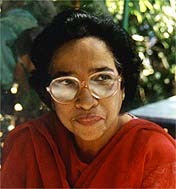Born in Ohio, USA on 23rd September 1838, to
an illiterate mother and a petty criminal father, Victoria had never been to
school until she was eight, and then on and off for three years. She was forced
by her father to become an itinerant clairvoyant along with the sister
Tennessee, telling people’s fortunes and acting as a medium for contacting
spirits. It brought in some money for their sustenance. But much later in life
she gave up spiritualism and even derided spiritualist frauds.
Victoria had many firsts to her credit. In 1868, along
with her sister Tennessee, she became the first woman to run a Stock Brokerage
Company on Wall Street, courtesy the wealthy industrialist Cornelius Vanderbilt
to whom she provided ‘psychological solace.’ But being a woman, she could not
get a seat in the New York Stock Exchange.
In 1870 she published the “Woodhull and Claflin’s Weekly”
and ran it for six years. In this paper she freely expressed her controversial
opinions on social reform, women’s suffrage, birth control, and taboo subjects
like free love and sexuality. Her paper was the first to print an English
translation of the Communist Manifesto by Karl Marx and Frederich Engels.
In 1871 through the influence of her friend Benjamin
Butler a senator of Massachusetts, she became the first woman to address a Congressional
Committee in the House of Representatives, on Women’s Rights. She said, “Women
are the equal of men before the Law and have equal rights.” This brought her
popularity and a position of leadership among the suffragettes. But a few years
later, many of them became her fiercest critics, fearing that her
unconventional lifestyle would put the Movement in jeopardy. When a
comprehensive History of Women’s Suffrage was complied, her name was never
mentioned.
Victoria will go down in history as the first woman who
ran for President of the United States in 1872. By then she had formed her own
“Equal Rights Party” and contested on its ticket. But she was below 35 years of
age which was the constitutionally mandated age for all candidates. No one took
her candidacy seriously and she received no electoral votes.
Victoria was also an author. Among her publications were
“Stirpiculture or the Scientific Propagation of the Human Race” (1888) “Garden
of Eden: Allegoric Meaning Revealed” (1889) and “The Human Body – The Temple of
God.”(1890). She was an excellent speaker and even her critics recognized and
acknowledged the power of her oratorical skills.
Victoria became a target of public criticism because of
her incorrigible lifestyle. She was thrice married and her first marriage was
at the age of 15, to Canning Woodhull with whom she had two children. She was
divorced after her first two marriages. During her time, divorce was socially
scandalous and also limited by the law. Women who divorced were stigmatized by
society. She had many other casual relationships too.
Victoria was jailed along with her sister for publishing
‘obscene literature’ about Reverend Henry Ward Beecher and his clandestine
affair with one of his parishioners.
In 1877, Victoria and her sister moved to England. She
continued to champion Women’s Rights and Women’s Suffrage, and spoke at many
public functions. She finally settled down as a wife of a wealthy banker John Biddulph
Martin in 1883.
Along with her daughter, Victoria published a magazine “The
Humanitarian” and ran it successfully for nine years. But after the death of her
husband, she gave up publishing and retired to a village Brendon’s Norton in Worcestershire.
She built a school there and became a champion of education in village schools.
Victoria Woodhull died on June 9, 1927. Her life was a story
of triumph over poverty, bad marriages, a hostile society and a sea of detractors.
She was a woman of rare courage and stood up boldly for her convictions.
